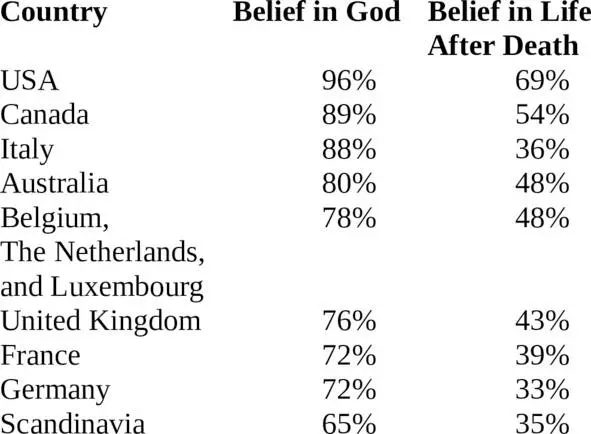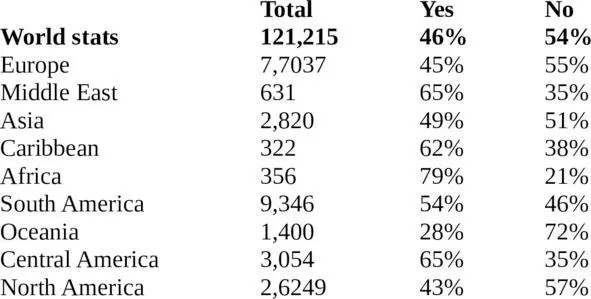1 ...6 7 8 10 11 12 ...27 Research into such questions in Western Europe and in Russia yielded similar results.
The Gallup Center’s statements regarding the number of people who believe in God and spiritual life after death are of similar interest. It would seem that these numbers should coincide – all religions speak of the immortal soul – but look for yourself at the results of their polls:

What God is it that people believe in if they deny the existence of life after physical death?
We took an interest in similar research carried out by other organizations and received several other facts. 121,215 people from all over the world took part in internet-surveys regarding the question “Do you Believe in God” on the site www.yesnogod.com. Here is how their votes were divided:

As you can see, the number of believers is significantly less than in the Gallup Center research.
In June of 2006, on the eve of Pope Benedict XVI’s visit to Germany, a German sociological institute conducted a poll in which only 50% of respondents indicated a belief in God. At the same time, according to statistics 65% of Germans officially belong to either the Roman Catholic or one of various Protestant churches. Does it follow that 15% of Germans belong to the church but do not believe in God?
We began to sort through these contradictions by carrying out research among our students, and revealed that all the above mentioned statistics are unreliable; not one of them reflects the real state of affairs. Here’s why.
In responding to the proposed questions with a monosyllabic “yes” or “no,” each person saw in the answer their own understanding of the given question, an understanding which turned out, under detailed questioning, to be either incredibly vague or completely absent. And so, including themselves among believers in God were people who have never read the Bible (such people constituted 60%), who do not observe the majority of their religion’s tenets (82%), who do not go to confession (99%), who know nothing about the life of even one saint (93%) and who even have a very incomplete understanding regarding the life of Jesus Christ (75%). Even the “Lord’s Prayer” could be recited by only 15% of those who responded as “believers.”
Those who did observe religious ceremonies couldn’t explain their content, origins or significance for the development of the soul. “Believers” did not even know the very core of Christian teaching, couldn’t explain what it means “to turn the other cheek,” Christ’s command to “love your enemies,” or the phrase “blessed are the poor in spirit.” There were few who could even list Christ’s commands from the Sermon on the Mount, not to speak of regularly applying them to their lives. But the saddest result of our research was that many people’s very understanding of God turned out to be alarmingly primitive. Most people imagined God as some sort of entity that constantly fixes us in his field of vision and carefully tallies good and bad deeds so that after each person’s death they can be called to account for their actions. Such an image is very similar to that which reined among our ancestors hundreds and thousands of years ago.
Many people counted themselves among Christians simply on the basis that they sometimes attend church. Others did it just to feel “like everyone else,” in case the people around them primarily consisted of such “believers.” A few were sincerely convinced that to consider oneself a Christian and to call oneself a believer on the survey it was enough to simply not kill, not steal and attend church on major holidays.
People who considered themselves atheists also did not shine with knowledge about even one of the questions directed at them. “I don’t believe, and that’s it!” proudly replied the unbelievers. “What specifically do you not believe in?” we attempted to clarify. “Not in God, not in the devil!” “And why don’t you believe?” “I don’t believe, and that’s it!”
In general, things went along the lines of the following parable:
The Parable of the Great Atheist
In ancient times, several thousands years ago, there lived a young man who considered himself an atheist. At the time rumors were circulating about some Great Atheist who could defeat any priest in a debate. The young man decided to find this Great Atheist and become his pupil. And so, after much wandering, he came to the hut where he had been told the Great Atheist lived. His knock was answered by an elderly voice:
“Who has the night brought searching to my door?”
“I seek the Great Atheist, so that I might become his student,” said the young man.
The elderly man allowed him to enter and began to question him.
“What do you wish to learn from me?” he asked his first question.
“How to debate with priests and to counter their arguments. I already do not believe in either God, souls, or the afterlife, but my arguments don’t suffice for debate.”
“But why don’t you believe?” asked the old man.
“It’s all nonsense!” cried the young man, “They simply doesn’t exist!”
“But have you read the Bible or the Koran?”
“Of course not! I’m an atheist!” he proudly replied.
“And have you consulted with priests?”
“So far no. That’s precisely why I came here, to learn how to argue with them.”
“And what do you know of clinical death?”
“At this point nothing.”
“Have you tried to leave your body?”
“No! Can one even do such a thing?”
“Have you talked with people who claim that this is not their first life?”
“I haven’t met any such people.”
“And what do you know about reincarnation?”
“I don’t even know that word.”
“Well, then you are not an atheist,” the old man summed up the conversation, “and you have nothing to do with me.”
“Then what am I?” said the surprised young man, “I don’t believe in anything!”
“You’re simply a fool,” the Great Atheist sighed compassionately.
Why is it that we are examining these questions about faith in such detail? Is it really necessary, in order to find complete happiness, to be a true believer, to delve into religious canons and practice saintly compliance with all religious tenets?
Of course not. We raise the question of faith in God simply because without a clear conception of the soul and its relationship to God it is impossible to understand either the meaning of life or its purpose, without which understanding happiness will, in its turn, seem unobtainable and the defeat of suffering – impossible.
And so, we have established the firm connection between people’s suffering and their total ignorance about the global questions of life. The diagnosis is clear, but what is the cure? Is it possible that knowledge could be the cure? And what knowledge in particular is necessary to embark on the road to happiness?
The results of our years of research point unequivocally to one conclusion: understanding oneself, the meaning of one’s life and one’s purpose and the fulfillment of that purpose here on earth is the one path to achieving true happiness.
Читать дальше














